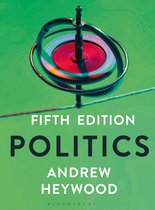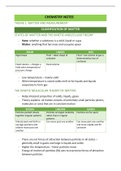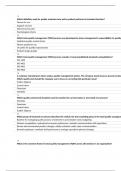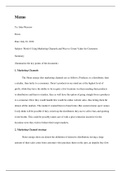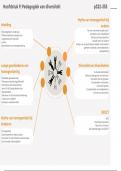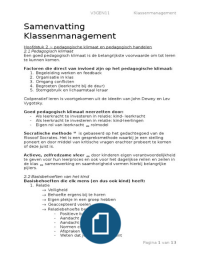Inleiding politicologie
Voorbereiding hoorcollege 1
Chapter 1
Defining politics
Politiek in de brede zin zijn de regels waaronder wij leven. Conflict en samenwerking zijn 2
belangrijke thema’s die hierbij komen kijken. In de politiek ga je bij conflicten naar
oplossingen zoeken ook al zijn er sommige conflicten waarbij dit niet lukt.
2 Broad approaches of defining politics
Politics as an arena
Case behaviour becomes political of where it takes place.
Politics as a process
politics is viewed as a process and can take place in any social context.
Autoriteit: gelegitimeerde macht
Macht: invloed om het gedrag van mensen te beinvloeden
Four concepts of politics
- Politics as the art of government: what concerns the state. But this is to ignore the
increasingly international influences on modern life.
- Politics as public affairs; already a broader conception. This view can be traced back
to Aristotle. Politics should not infringe on ‘personal’ affairs, and should exclude the
personal. Feminist thinkers challenge this notion. Because women have been
confined to an private existence issues like gender equality are of no political
importance because politicics take place in the public sphere.
- Politics as compromise and consensus; this conduct to the way decisions are made.
The belief that society is characterized by consensus and not by conflict. Critics point
out that this conception of politics is heavily biased to the form of politics that take
place in western pluralist democracies. However, this view has a positive character.
- Politics as power all social activities of human existence.
o Power as decision-making
o Power as agenda setting
o Power as thought control according to Steven Lukes
Advocates of politics of power include feminist and Marxists.
Approaches to the study of politics
- The philosophical tradition: key thinker Plato
o Not objective as it deals with questions such as ‘Why should I obey the
state?’. These are ethical and normative questions that are thought about. It
examines what major thinkers such as Plato and Marx said and how they
justified their views. The approach is prescriptive because it makes judgement
and offers recommendations.
, - The empirical tradition
o All hypotheses and theories should be tested by a process of observation. The
approach seeks to analyse and to explain and is therefore descriptive. This
developed into positivism all forms of philosophical enquiry, should adhere
strictly to the methods of the natural sciences.
- Behavioralism
o Observable behavior provides quantifiable data for research
- Rational-choice theory
o Rationally self-interested behavior of the individuals involved are studied. But
this approach may overestimate human rationality and forgets to pay
attention to social and historical factors.
- New institutionalism
o New institutionalists emphasize that institutions are embedded in a particular
normative and historical context. The institution itself operates within a larger
and more fundamental body of assumptions and practices. Criticists say that
political actors are viewed as prisoners of the institutional contexts in which
they operate.
- Critical approaches
o They seek to contest the political status quo, they seek to uncover inequalities
and assymetries that mainstream approaches tend to ignore. They emphasize
the role of consciousness in shaping social conduct and the political world.
Concept is a general idea about something, usually expressed in a single word or short
phrase.
A model is usually thought of as a representation of something, usually on a smaller scale, as
in the case of a doll’s house. Conceptual models are analytical tools, an explanatory device.
A system is an organized or complex whole, a set of interrelated and interdependent parts
that form a collective entity.
A paradigm is an intellectual framework comprising interrelated values, theories and
assumptions, within which the search for knowledge is conducted.
Inputs demands and supports from the general publiv
Outputs decisions and actions of government.
Chapter 2 political ideas and ideologies
Classical ideological traditions (liberalism, conservatism, socialism)
Liberalism key ideas:
- Individualism
- Freedom
- Reason
- Equality
- Toleration (pluralism is healthy)
- Consent
- Constitutionalism
,Classical liberalism
o Extreme form of individualism deeply unsympathetic attitude towards the
state and all forms of government intervention
o Nachtwaker staat
o Free market
Modern liberalism (social or welfare liberalism)
o More state intervention particularly in social welfare
Conservatism: Edmund burke
The ideas arose as a reaction against the growing pace of economic and political change. It
harked back to the ancient regime.
- Tradition
- Pragmatism: practical circumstances and practical goals
- Human imperfection
- Organicism
- Hierarchy
- Authority
- Property
Paternalistic conservatism: the privileged have a duty to look after the less well of, this will
lead to social cohesion and unity and will prevent a social revolution.
The new Right: key thinker Friedrich von Hayek, free market economist.
Neo liberalism: unregulated market capitalism will deliver efficiency and growth. The nanny
state is breeding a culture of dependence. Government has a damaging effect on human
affairs.
Neoconservatism: wishes to restore authority and to return to traditional values. They view
multi-cultural societies with concern as they are conflict ridden.
Socialism developed as a reaction against the emergence of industrial capitalism.
- Community
- Fraternity: collectivism over individualism
- Social equality
- Need; material benefits should be distributed on the basis of need
- Social class
- Common ownership
Revolutionary socialist: Lenin
Reformist socialist: practice a form of constitutional politics, embraced what increasingly
came to be called ‘social democracy’
Marxism: principal alternative to the liberal rationalism of the west. The collapse of
communism at the end of the 20th century did not mean the death of Marxism as a political
ideology.
Classical marxism: Karl Marx, highlights the importance of economic life and the conditions
under which people produce and reproduce their means of subsistence.
, Orthodox communism: Lenins contribution to Marxism was his theory of the revolutionary
or vanguard party. control of the state, central planning, state bureaucracy. This reflects
lenin’s fear that the proletariat would not realize its revolutionary potential.
Neo- Marxism: subtle form of Marxism, human beings were seen as makers of history and
not as puppets controlled by impersonal material forces.
Social democracy: balance between the market and the state, between the individual and
the community. Concern for the weak and vulnerable in the society.
New social democracy, third way
- Embraced liberal ideas of equality, opportunity and meritocracy. Workfare state,
individuals becoming self-reliant, giving people a hand up, not a hand out.
Anarchism
- Political authority in all its forms is both evil and unnecessary.
- Point of intersection between liberalism and socialism.
- Wish for a stateless society.
Italian fascism statism
German fascism racialism
Feminism: Mary Wollstonecraft.
- Sharp distinction between sex and gender
- Patriarchy ( the dominance of the father within the family symbolizes male
supremacy in all other institutions)
- The personal is the political politics take place within all social groups
- Gender equality
- The politics of difference
Cosmopolitanism: the ideological expression of globalization. They believe in a world state.
Religious fundamentalism
- Religion can not and should not be confined to the private sphere politics is
religion.
Populism : the central feature of populism is the idea that society is divided into two warring
groups: the ‘pure’ people and the ‘corrupt’ elite. It has a hostility towards liberalism because
of it’s pluralist character.
Chapter 3 Politics and the state
Charles tilly: the central factor that explains the development of the modern state is it’s
ability to fight wars war made the state, and the state made war.
Marxists, think the emergence of the state traced back to the transition from feudalism to
capitalism.
Voorbereiding hoorcollege 1
Chapter 1
Defining politics
Politiek in de brede zin zijn de regels waaronder wij leven. Conflict en samenwerking zijn 2
belangrijke thema’s die hierbij komen kijken. In de politiek ga je bij conflicten naar
oplossingen zoeken ook al zijn er sommige conflicten waarbij dit niet lukt.
2 Broad approaches of defining politics
Politics as an arena
Case behaviour becomes political of where it takes place.
Politics as a process
politics is viewed as a process and can take place in any social context.
Autoriteit: gelegitimeerde macht
Macht: invloed om het gedrag van mensen te beinvloeden
Four concepts of politics
- Politics as the art of government: what concerns the state. But this is to ignore the
increasingly international influences on modern life.
- Politics as public affairs; already a broader conception. This view can be traced back
to Aristotle. Politics should not infringe on ‘personal’ affairs, and should exclude the
personal. Feminist thinkers challenge this notion. Because women have been
confined to an private existence issues like gender equality are of no political
importance because politicics take place in the public sphere.
- Politics as compromise and consensus; this conduct to the way decisions are made.
The belief that society is characterized by consensus and not by conflict. Critics point
out that this conception of politics is heavily biased to the form of politics that take
place in western pluralist democracies. However, this view has a positive character.
- Politics as power all social activities of human existence.
o Power as decision-making
o Power as agenda setting
o Power as thought control according to Steven Lukes
Advocates of politics of power include feminist and Marxists.
Approaches to the study of politics
- The philosophical tradition: key thinker Plato
o Not objective as it deals with questions such as ‘Why should I obey the
state?’. These are ethical and normative questions that are thought about. It
examines what major thinkers such as Plato and Marx said and how they
justified their views. The approach is prescriptive because it makes judgement
and offers recommendations.
, - The empirical tradition
o All hypotheses and theories should be tested by a process of observation. The
approach seeks to analyse and to explain and is therefore descriptive. This
developed into positivism all forms of philosophical enquiry, should adhere
strictly to the methods of the natural sciences.
- Behavioralism
o Observable behavior provides quantifiable data for research
- Rational-choice theory
o Rationally self-interested behavior of the individuals involved are studied. But
this approach may overestimate human rationality and forgets to pay
attention to social and historical factors.
- New institutionalism
o New institutionalists emphasize that institutions are embedded in a particular
normative and historical context. The institution itself operates within a larger
and more fundamental body of assumptions and practices. Criticists say that
political actors are viewed as prisoners of the institutional contexts in which
they operate.
- Critical approaches
o They seek to contest the political status quo, they seek to uncover inequalities
and assymetries that mainstream approaches tend to ignore. They emphasize
the role of consciousness in shaping social conduct and the political world.
Concept is a general idea about something, usually expressed in a single word or short
phrase.
A model is usually thought of as a representation of something, usually on a smaller scale, as
in the case of a doll’s house. Conceptual models are analytical tools, an explanatory device.
A system is an organized or complex whole, a set of interrelated and interdependent parts
that form a collective entity.
A paradigm is an intellectual framework comprising interrelated values, theories and
assumptions, within which the search for knowledge is conducted.
Inputs demands and supports from the general publiv
Outputs decisions and actions of government.
Chapter 2 political ideas and ideologies
Classical ideological traditions (liberalism, conservatism, socialism)
Liberalism key ideas:
- Individualism
- Freedom
- Reason
- Equality
- Toleration (pluralism is healthy)
- Consent
- Constitutionalism
,Classical liberalism
o Extreme form of individualism deeply unsympathetic attitude towards the
state and all forms of government intervention
o Nachtwaker staat
o Free market
Modern liberalism (social or welfare liberalism)
o More state intervention particularly in social welfare
Conservatism: Edmund burke
The ideas arose as a reaction against the growing pace of economic and political change. It
harked back to the ancient regime.
- Tradition
- Pragmatism: practical circumstances and practical goals
- Human imperfection
- Organicism
- Hierarchy
- Authority
- Property
Paternalistic conservatism: the privileged have a duty to look after the less well of, this will
lead to social cohesion and unity and will prevent a social revolution.
The new Right: key thinker Friedrich von Hayek, free market economist.
Neo liberalism: unregulated market capitalism will deliver efficiency and growth. The nanny
state is breeding a culture of dependence. Government has a damaging effect on human
affairs.
Neoconservatism: wishes to restore authority and to return to traditional values. They view
multi-cultural societies with concern as they are conflict ridden.
Socialism developed as a reaction against the emergence of industrial capitalism.
- Community
- Fraternity: collectivism over individualism
- Social equality
- Need; material benefits should be distributed on the basis of need
- Social class
- Common ownership
Revolutionary socialist: Lenin
Reformist socialist: practice a form of constitutional politics, embraced what increasingly
came to be called ‘social democracy’
Marxism: principal alternative to the liberal rationalism of the west. The collapse of
communism at the end of the 20th century did not mean the death of Marxism as a political
ideology.
Classical marxism: Karl Marx, highlights the importance of economic life and the conditions
under which people produce and reproduce their means of subsistence.
, Orthodox communism: Lenins contribution to Marxism was his theory of the revolutionary
or vanguard party. control of the state, central planning, state bureaucracy. This reflects
lenin’s fear that the proletariat would not realize its revolutionary potential.
Neo- Marxism: subtle form of Marxism, human beings were seen as makers of history and
not as puppets controlled by impersonal material forces.
Social democracy: balance between the market and the state, between the individual and
the community. Concern for the weak and vulnerable in the society.
New social democracy, third way
- Embraced liberal ideas of equality, opportunity and meritocracy. Workfare state,
individuals becoming self-reliant, giving people a hand up, not a hand out.
Anarchism
- Political authority in all its forms is both evil and unnecessary.
- Point of intersection between liberalism and socialism.
- Wish for a stateless society.
Italian fascism statism
German fascism racialism
Feminism: Mary Wollstonecraft.
- Sharp distinction between sex and gender
- Patriarchy ( the dominance of the father within the family symbolizes male
supremacy in all other institutions)
- The personal is the political politics take place within all social groups
- Gender equality
- The politics of difference
Cosmopolitanism: the ideological expression of globalization. They believe in a world state.
Religious fundamentalism
- Religion can not and should not be confined to the private sphere politics is
religion.
Populism : the central feature of populism is the idea that society is divided into two warring
groups: the ‘pure’ people and the ‘corrupt’ elite. It has a hostility towards liberalism because
of it’s pluralist character.
Chapter 3 Politics and the state
Charles tilly: the central factor that explains the development of the modern state is it’s
ability to fight wars war made the state, and the state made war.
Marxists, think the emergence of the state traced back to the transition from feudalism to
capitalism.

